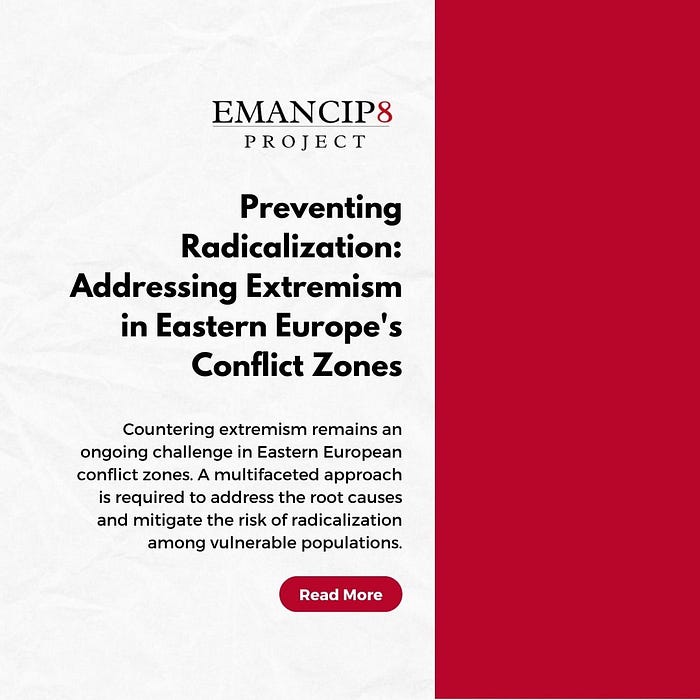Preventing Radicalization: Addressing Extremism in Eastern Europe's Conflict Zones by Emancip8 Project

Countering extremism remains an ongoing challenge in Eastern European conflict zones. A multifaceted approach is required to address the root causes and mitigate the risk of radicalization among vulnerable populations. By implementing comprehensive strategies that encompass political, social, and economic dimensions, it is possible to foster environments that discourage extremism and promote sustainable peace.
One of the key factors driving radicalization in conflict-affected areas is the absence of inclusive political institutions (Atran, 2010). Creating spaces for dialogue that involve all segments of society, including minority groups and women, can ensure that grievances are addressed and the risk of radicalization is reduced. Furthermore, it is essential to promote transparent and accountable governance, which helps build trust in state institutions and fosters legitimacy (Horgan & Braddock, 2010).
Education also plays a significant role in preventing radicalization. Curricula that encourage critical thinking, promote tolerance, and teach about different cultures and religions can foster a sense of unity and inclusivity (Beswick & Jackson, 2018). In addition, providing opportunities for skill development and vocational training can enhance the employability of young people, reducing the likelihood that they will be drawn into extremist groups (Porges, 2011).
Addressing socioeconomic disparities is another crucial aspect of countering extremism. By investing in infrastructure, healthcare, and education in conflict-affected areas, governments can help alleviate poverty and create opportunities for upward mobility. Economic development initiatives that target marginalized communities can also contribute to social cohesion and reduce the appeal of extremist ideologies (Neumann, 2013).
Lastly, international cooperation is essential in the fight against extremism. Regional and global partnerships enable the sharing of intelligence, resources, and best practices, which can strengthen the effectiveness of counter-extremism efforts. Moreover, collaboration between state and non-state actors, such as civil society organizations and the private sector, can facilitate the implementation of innovative and context-specific solutions (Gartenstein-Ross & Grossman, 2009).
In conclusion, addressing extremism in Eastern Europe’s conflict zones requires a comprehensive and multifaceted approach that encompasses political, social, and economic dimensions. By fostering inclusive political institutions, promoting education and skill development, addressing socioeconomic disparities, and facilitating international cooperation, it is possible to mitigate the risk of radicalization and build a more sustainable peace.
References:
Atran, S. (2010). Talking to the enemy: Violent extremism, sacred values, and what it means to be human. London: Allen Lane.
Beswick, D., & Jackson, P. (2018). At the edge of the global: Schooling, politics and the geographies of exclusion. Progress in Human Geography, 42(5), 628–646.
Gartenstein-Ross, D., & Grossman, L. (2009). Homegrown terrorists in the U.S. and U.K.: An empirical examination of the radicalization process. Washington, DC: Foundation for Defense of Democracies.
Horgan, J., & Braddock, K. (2010). Rehabilitating the terrorists? Challenges in assessing the effectiveness of de-radicalization programs. Terrorism and Political Violence, 22(2), 267–291.
Neumann, P. R. (2013). Options and strategies for countering online radicalization in the United States. Studies in Conflict & Terrorism, 36(6), 431–459.
Porges, M. (2011). Reform school for radicals. The American Interest, 6(6), 20–26.
Read more at Emancip8 Project.
Comments
Post a Comment